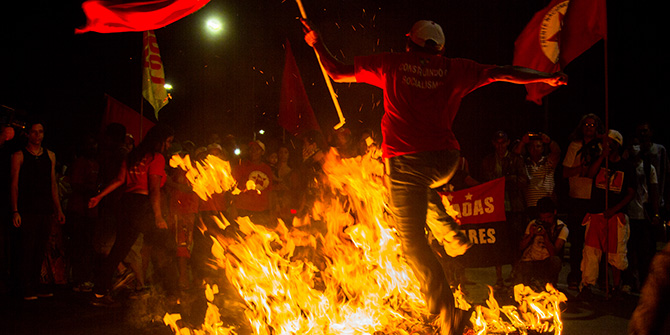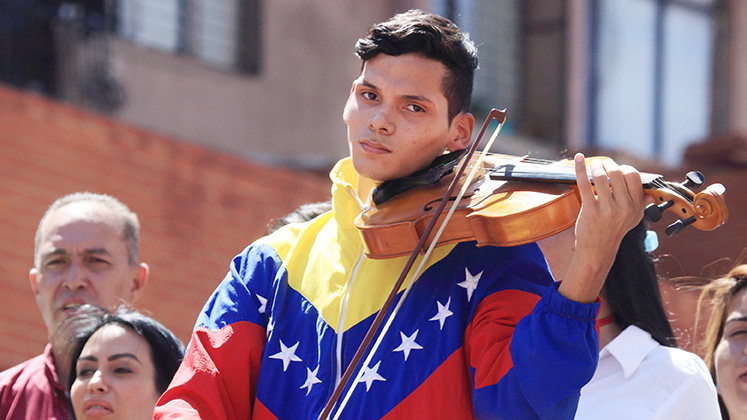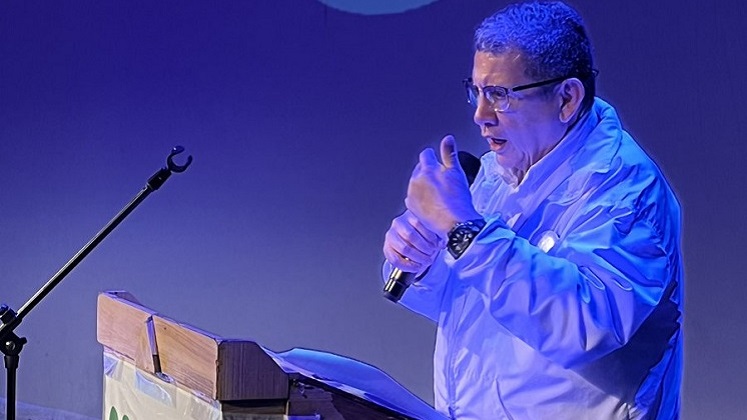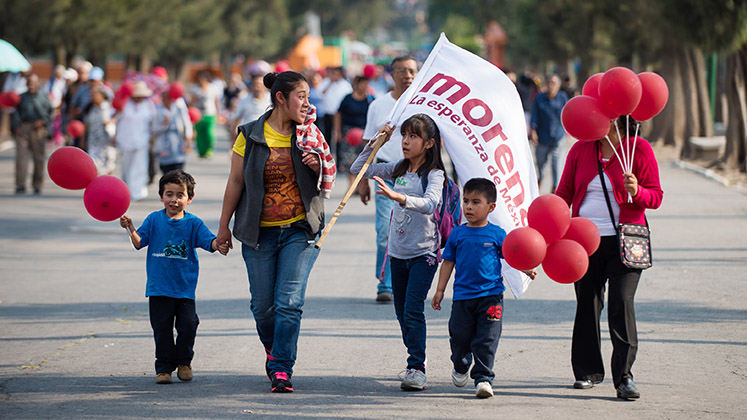 The poisonous political climate around the October 2018 elections in Brazil has been brewing since Dilma Rousseff’s first term. Attacks on various institutions from both left and right, combined with massive corruption and fractious culture wars, have allowed Jair Bolsonaro and his millenarian evangelical supporters to expand his personality cult into this political vacuum, writes David Lehmann (Federal University of Bahia).
The poisonous political climate around the October 2018 elections in Brazil has been brewing since Dilma Rousseff’s first term. Attacks on various institutions from both left and right, combined with massive corruption and fractious culture wars, have allowed Jair Bolsonaro and his millenarian evangelical supporters to expand his personality cult into this political vacuum, writes David Lehmann (Federal University of Bahia).
Since as far back as the Dilma Rousseff’s first election win in 2010, large swathes of opinion in Brazil have been prey to a shocking degree of paranoia and conspiratorial obsession.

Even then there were online campaigns warning that the Workers’ Party (PT) would crush the country under the boot of communism and that the Bolsa Família conditional cash transfer programme was a vote-getting exercise designed to leave the poor masses of the North and Northeast dependent on the state.
The roots of Brazil’s poisonous political climate
After Dilma’s second election win in 2014, this hostility poisoned the political atmosphere, helped of course by the corruption scandals that first emerged from Petrobras earlier that year and then cast their long shadow across almost the entire political spectrum (with only those parties left of the PT not involved).
As soon as Dilma was elected, the defeated candidate Aecio Neves cried foul, claiming that the election had been fixed. Yet he never produced any evidence to support this view. Although not a very substantial figure in his own right, it was he who set in motion the process that thwarted Lula’s return to the presidency in 2018, as it was at this point that a wide variety of actors realised that Lula’s exclusion served their interests.
The atmosphere of conspiracy, fed by endless reporting from a labyrinthine legal system, has grown ever thicker, particularly with widespread suspicion of easily manipulated social media. But it has also been fed by attacks on the media coming from the left, with TV Globo and Folha de São Paulo accused of bias in their reporting and in their treatment of politicians.
Meanwhile, as the poisonous web of the Petrobras/Lava Jato scandal grew ever larger, PT sympathisers and others from the far left began also to accuse the judiciary of bias. This may well have been a strategic mistake, however, as the PT itself was deeply involved in this and in the earlier mensalão scandal during Lula’s first term.
In broader terms, attacking the judiciary is playing with fire for a party that aims to govern the country. Confidence in the legislative and executive branches is already low, so if confidence in the judiciary is weakened, obstacles to dictatorship are also weakened. In this sense, international calls to allow Lula to stand in these elections were in effect calls for the judiciary to substitute a judicial decision with a political one, even if his trial and appeal have not inspired great confidence.
Lava Jato also created the climate in which Dilma could be impeached by Congress, as anti-PT sentiment grew far more than sentiment against other parties whose politicians were just as involved. The Supreme Court itself intervened in 2016 to remove Eduardo Cunha, the Speaker of the Chamber of Deputies who had masterminded the impeachment, yet the anti-PT bias in public opinion remains.
From the courts to the streets
In 2013, a massive wave of demonstrations sparked by repression of protests against a transport price-hike in São Paulo appeared to show a left-wing shift in public opinion. But despite the emergence of an ad hoc protest movement demanding free bus and train passes (Movimento Passe Livre) and the involvement of shadowy anarchists known as “ninjas”, this turned out not to be the case.

In fact, it was the birth of an equally shadowy but strictly free-market outfit called Movimento Brasil Livre (MBL). This group sponsored demonstrations calling for a change of government, even if it came via a military coup.
Protest slogans became ever more shrill, offensive, and even scatological, as demonstrated by the pitiless mocking of Dilma by well-heeled Brazilian fans attending the 2014 World Cup. Dilma was perhaps more harshly treated on account of being a single woman, with this status also fanning the flames of culture wars and moral panics about gender from which the country had previously seemed immune.
During Dilma’s time in office, issues of gender and same-sex marriage in particular were capitalised upon by the well-organised evangelical caucus in Congress (some 80 members), which campaigned relentlessly on these themes, while also peppering their harsh rhetoric with poisonous slogans against gay people, Indians, and blacks.
The Pope’s campaign against “gender ideology” let this particular genie out of its bottle, fuelling (amongst other things) the rumour that a law permitting sex with three-year-old children was being prepared in Congress. Mix in a pinch of millenarianism and a dash of conspiratorial thinking and you get the rise of a previously obscure congressman from Rio, Jair Bolsonaro.
The cult of Bolsonaro
Jair Bolsonaro has been a Federal Deputy for Rio since 1991 and enjoys massive support from this the most evangelical of Brazil’s cities.
During Dilma’s impeachment, he gained notoriety for his incendiary statements, quips, and slogans, which would make even the most fervent Tea Party supporter blush. There have also been various misdeeds, failings, and near-criminal behaviours during his time as an army officer and a politician, but these appear to do nothing to undermine his support.

Crucially, Bolsonaro has the instincts required to build a personality cult, putting himself physically centre-stage and advocating for the free circulation of weapons as a response to the country’s appalling homicide rate. His hostility to homosexuality and contempt for blacks are expressed not in terms of reason or principle, but rather in terms of what he would do if one of his sons were to come out as gay or marry an Afro-Brazilian.
Not only does he get away with such things, they have propelled him to the front of the race for the presidency, where he stands to gain about a quarter of the votes in the first round on 7 October, even though many of those voters themselves must be dark-skinned. The knife attack which almost killed him on 7 September, supplemented by pictures of him recuperating in hospital, have further accentuated the central role of his physical person.
There is no training or rehearsing to create a cult and a mystique: it takes a particular kind of personality, and very few people simply “have it”. But when it comes to religious support, there are some extra ingredients here.
Bolsonaro’s appeal for evangelicals was reinforced by a personal visit to Israel to be baptised by full immersion in the river Jordan, just as many thousands of his fellow Brazilians have been. Bolsonaro has also promised to move Brazil’s embassy to Jerusalem. Even his number on the ballot paper, 17, has chimed with religious supporters, with many creating videos in which they recite chapters 17 and verses 17 from books of the bible such as Exodus, Chronicles, Revelation, Isaiah, and so on. Their millenarianism feeds Bolsonaro’s cult just as it will feed their belief that any loss in the second round could only be the result of fraud.
Notes:
• The views expressed here are of the authors and do not reflect the position of the Centre or of the LSE
• Please read our Comments Policy before commenting





